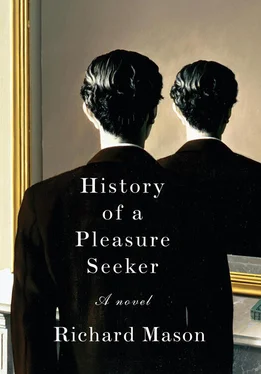He woke from this dream in a fit of self-disgust that would not lift. He wanted to hurt himself and slammed his fist against the wall — impulsively, at two-thirds of his full force. The pain was stunning. It made him understand that he did not really wish to break his hand. A more profound expiation occurred to him: to renounce all he had been and start anew. He inched from the wall the loose brick behind which he had stored his treasures as a boy. All that remained in this cavity was a French passport in the name of “Pierre Barol,” which Nina had obtained for him in Paris nine years before and about which Herman Barol knew nothing. With the sense that he was exchanging his soiled identity for a fresh one, he packed it in his trunk and went downstairs.
Piet took the sleeper for Paris on the sixteenth day of the New Year and arrived early on a dreary morning, while the brass lamps were still burning beneath the vast glazed roof of the Gare du Nord. His trunk was intended for people with porters at their disposal. As he dragged it through the starched, elegant crowds, he began to hate it.
The boat train for Le Havre left the following day after lunch. He had come a night early, despite the expense of a Parisian hotel, because he could find no way to say good-bye to his mother in the house now so scrupulously scrubbed by Marga Folker. They had been in the city once together nine years before, when he was fifteen and she thirty-five — ostensibly to visit one aunt and attend the funeral of another. In fact Nina had hoped to leave her husband and escape with her child to France. It had taken years to gather the courage to conceive this plan and implement its first stage. It took tante Maude Michaud twenty minutes to destroy it with the opinion, pronounced as fact, that Herman would pursue her for the boy and wrest Piet from her forever.
In the end Nina had not dared. Instead she spent sixteen years of savings on five days of sophisticated hedonism with her son and returned to Leiden defiant. They stayed in a rickety pension on the rue des Martyrs, beneath the blinding white marble of the Sacré Coeur. Nina had chosen Montmartre so that Piet might observe the perils of la vie bohème at first hand; also so that he could imagine the horrors of the Commune and see the church built to atone for them. They went to tante Henriette’s funeral and made a day’s worth of family calls. Otherwise they were entirely alone, immersed in each other as in a love affair.
Nina chose three restaurants. The first was a back room with bare wooden benches and crates of lobsters delivered from the patron ’s brother in Normandy. Here she taught Piet how to drink a carafe of Chablis over a lunch of shellfish while entertaining a pretty woman (herself in an adorable new hat), without feeling giddy or unwell or talking too loudly. The next she chose for its rabbit, which was everything a simple country meal should be. The last was a grander establishment close to the Palais Royale where they ate timbale de sole stuffed with chopped truffles.
This meal cost so much that nothing was left for tickets to the opera. They walked through the Louvre and along the pale white paths of the Tuileries, humming together the great duets of Halévy, Gounod and Bizet. It was a night for French composers, Nina said. They reached the Place de la Concorde and paused before the traffic on the Champs Elysées. They had two francs over and Nina knew just the place to spend them. She led Piet up the rue de la Paix, past a perfumier whose scents were so potent neither their crystal vials nor the shop’s closed doors could contain them. “You must face the world as an equal,” she said, drawing him on and climbing the shallow, blue-carpeted steps of the Ritz Hotel with her arm in his.
The doorman did not question them. They had a coffee at the bar and watched the crowds of élégants . After some time, a gentleman with curled whiskers invited them to a matinée the following day.
“He takes me for a demimondaine, ” she whispered when the man had retreated, his invitation refused. “It’s because I’ve nursed my coffee so long.”
“What’s a demimondaine, Mummy?”
“Come, I’ll show you.”
They strolled to the Place de l’Opéra and stood beside the steps of the Garnier as the evening’s audience arrived. With great precision, Nina pointed out the leading courtesans of the day and the subtle but significant ways they distinguished themselves from their lovers’ wives.
Piet spent the night wandering the pale, magnificent city, lost in memories of her. With his mother he might have shared his misdeeds at Herengracht 605. Her absence left him to bear his regret unaided, and its burden was so heavy he did not join the conversation on the boat train the next day but hid behind a newspaper feeling profoundly alone.
He cheered briefly at sight of the ship. One could not feel entirely deflated on a crowded quay before her. The Eugénie had a black hull and a superstructure of dazzling white, repainted for the tropics. A strip of scarlet showed just above the waterline; she had four funnels, black with scarlet bands, and above her anchor gleamed the golden shell and crossed L s of the Loire Lines.
High above him on a private gangway, the first-class passengers were entering the ship. He could hear their band’s sparkling music. To his left, the long lines queuing for third class and steerage looked so much happier than he was that he could not feel superior to them. He thought of the sum he had spent on his own ticket and tried to be optimistic, but the tourist-class vestibule, carpeted in violent swirls of green and red, dismayed him. So did the stewards’ demeanor. As one led him to his stateroom with the air of doing him a distasteful favor, the pleasures he had renounced in Amsterdam recurred painfully to him.
“Votre cabine, monsieur.” The steward opened the door, handed him a receipt for his trunk, and departed with it.
At the Loire Lines offices in Amsterdam Piet had not thought to ask for the specifications of his accommodation. Now he saw he had been unwise not to. His cabin had no porthole and was very hot. Intended originally as third-class quarters, it had been converted to tourist class to cater for additional demand. But its superficial comforts — a mahogany washstand, monogrammed linen, a copied Fragonard in oils — could not disguise its proximity to the engines. As these were fired it shook violently.
Piet sat down on his bunk, aggrieved. Fifteen minutes later, the door opened and a stocky young man with florid cheeks and slick-backed blond hair entered, complaining in a loud English voice. “It will not do. I was promised — Yes, I jolly well will speak to the purser.” He shook Piet’s hand forcefully. “Percy Shabrill. An honor. Do excuse me.” Percy Shabrill left again and began shouting in the corridor. Piet hoped he and his voice would find another berth, but it was not to be. He reappeared as the departure bells sounded, his cheeks redder than they had been before. “Damned Frenchies.” He flung himself onto the opposite bunk. “They’ve given us the worst cabin on the bloody boat. Hope you don’t snore, old fellow. I take a dim view of snorers.”
“So do I.”
They went up together onto the tourist-class promenade deck to watch as the ship left the harbor for the open ocean. The wind and the engines drowned the string quartet, but Percy’s voice carried well over the competing noise. “That’s me out of Europe for some time. I won’t be back till they’ve invented an air balloon. I’m not mad keen on the sea.” Percy was going to South Africa to join his brother at Johannesburg. His faith in his prospects emphasized to Piet how drastically his own confidence had dwindled since the day he had sold Maarten Vermeulen-Sickerts’ silver man. Perhaps he should have kept him for luck. Percy leaned closer. “You ask how I’m going to get rich.”
Читать дальше












